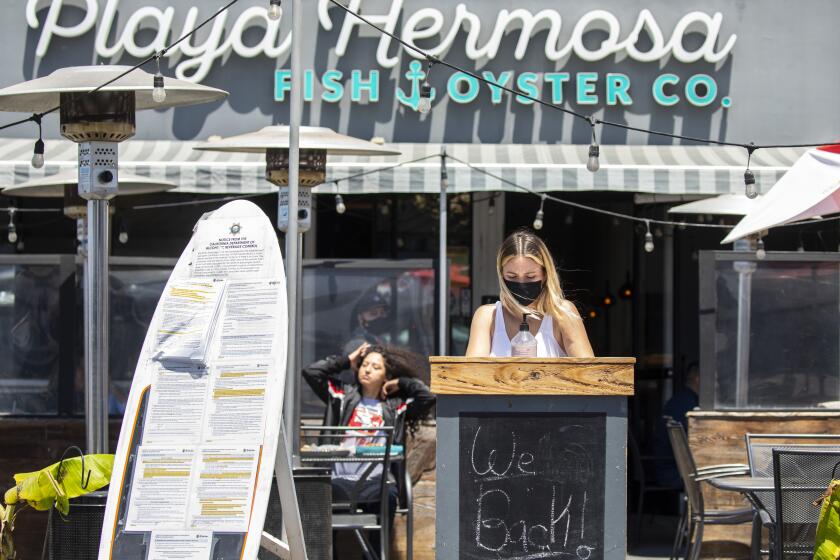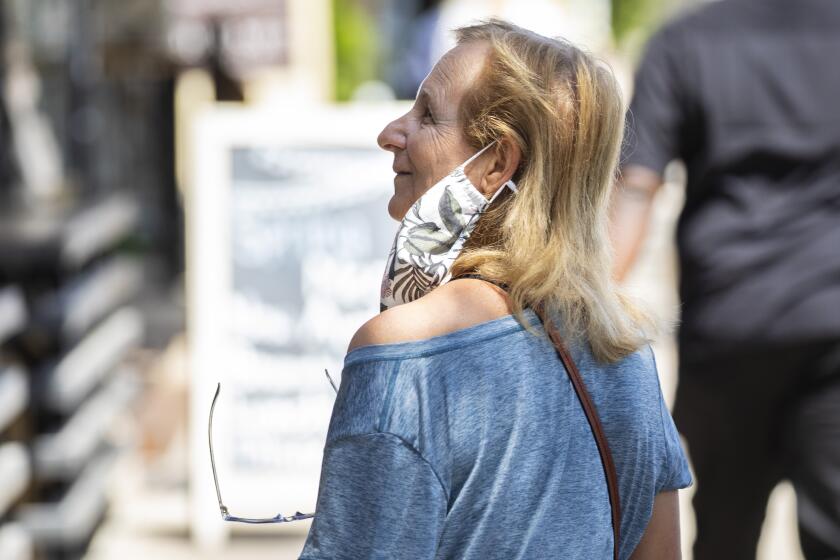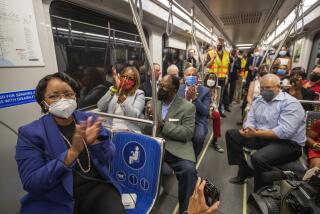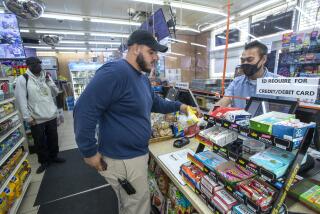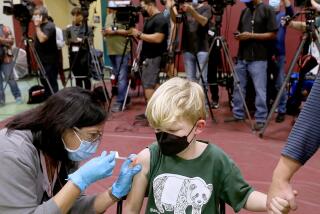California poised to drop mask rules for vaccinated workers and end distancing at workplaces
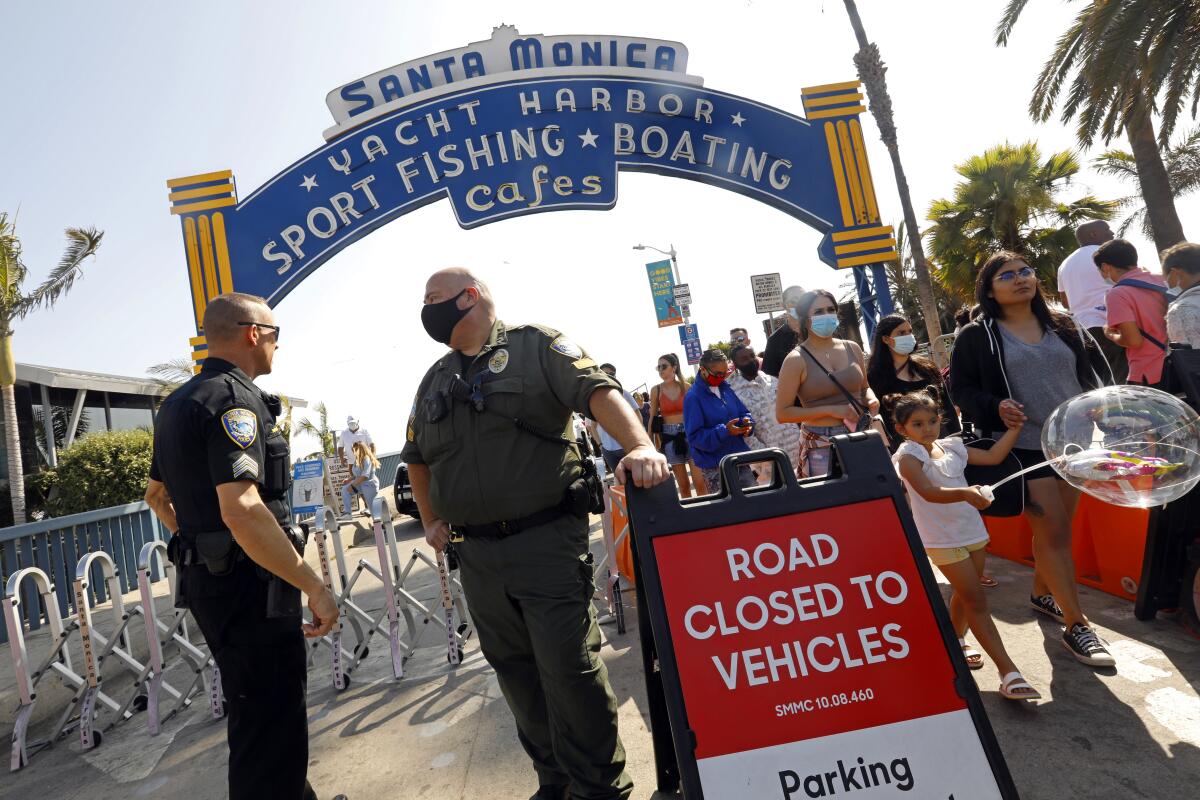
A California safety board will vote on a proposal Thursday that would allow most fully vaccinated workers in many workplaces to stop wearing masks and end physical distancing requirements for all workers.
The proposal would also end the requirement to install the cleanable solid partitions designed to reduce viral transmission through the air — like the clear plastic barriers that separate customers and cashiers.
In addition, the proposal calls for employers to maximize the amount of fresh outside air that comes into the building, such as by letting in outdoor air.
Workplaces would be required to provide masks to workers who are not fully vaccinated and ensure that they wear them when they are indoors or in vehicles. The proposal would require employers to provide respirators — like N95 masks that filter out tiny particles from the air — to employees not yet fully vaccinated if they request them.
Normally, it would take at least 10 days before such a plan would go into effect, pending a review by the state Office of Administrative Law, meaning the earliest that change could occur would be on June 28. But on Monday, Gov. Gavin Newsom said at a news conference that if the board approves the proposal, he would enact an executive order to make those changes immediately, effective on the same day the board takes action.
A California workplace safety board recommends ending mask rules for workers if everyone in a room is vaccinated against COVID-19.
It would be similar to rules that will go into effect on Tuesday for the public, which will allow people who are fully vaccinated to go into indoor public settings — like a store or gym — without a mask, unless required by the business or venue.
Starting Tuesday, the state will remove most remaining restrictions on businesses and significantly relax mask-wearing rules for those who are vaccinated — two significant efforts made possible by the steady retreat of COVID-19.
Gone will be the system of color-coded tiers that for months kept counties on pins and needles as they awaited word for how widely activities could resume. Businesses that have long operated at half or even less capacity will be able to throw open their doors.
They include — in counties in the least restrictive tier like L.A., San Diego, Orange, Ventura, San Francisco and Santa Clara — restaurants, gyms and movie theaters that have been allowed to open at only 50% capacity; bars that don’t serve food that were limited to 25% capacity or 100 people, whichever was fewer; and amusement parks and fairs that were capped at 35% capacity.
None of those capacity limitations will be in force beyond Tuesday morning.
Also as of Tuesday, Californians who are fully vaccinated for COVID-19 will be able to shed their face masks in most nonwork situations. Unvaccinated people are still required to wear masks in public settings.
From mask rules to social distancing, here’s what to expect come June 15.
The issue about how to handle workplaces has been trickier and sparked weeks of debate.
The latest proposal, written by the California Division of Occupational Safety and Health, or Cal/OSHA, would still require unvaccinated workers to wear masks in indoor work settings and in vehicles. Some of the only exceptions under which unvaccinated workers can remove their masks are if they’re alone in a room or eating or drinking, in which case they should still keep distance from other people by at least six feet.
The proposal is looser than an earlier version that the Occupational Safety and Health Standards Board approved earlier this month and rescinded in recent days. That rescinded proposal would have required even fully vaccinated people to still mask up in an indoor workplace if even just one person who was unvaccinated or whose vaccination status was unknown entered the room.
Cal/OSHA staff had initially defended its proposal because, they said, it would be easier to enforce a universal mask-wearing policy if there were some workers in a room who were unvaccinated. They said it would be hard for employers to just make sure unvaccinated people were wearing masks.
Cal/OSHA and the state’s Occupational Safety and Health Standards Board came under heavy criticism by employers and others for issuing rules that were faulted for being too complicated and confusing. Some warned that forcing vaccinated workers to still wear masks if unvaccinated people shared the room would lead inoculated employees to resent those who haven’t received their shots.
Eventually, the Occupational Safety and Health Standards Board signaled it will adopt workplace mask rules that are more consistent with the state Department of Public Health’s mask rules for the general population.
Some infectious diseases experts have said that at some point, unvaccinated workers need to take responsibility for not being vaccinated, and wear a mask to protect themselves.
The proposal being considered by the board will affect most workplaces, but work sites such as healthcare settings will not be affected, as they are regulated by a more strict standard.
Although California’s reopening journey has been rocky to say the least — two previous attempts last spring and autumn eventually had to be abandoned following corresponding surges in infections, hospitalizations and deaths — officials and many health experts are confident the state can avoid a similar fate this time around because of relatively high rates of vaccination.
California has for several months recorded one of the lowest coronavirus case rates in the country, and is now enjoying a relatively robust level of vaccine coverage.
Nearly 40 million COVID-19 vaccines have been administered statewide, and 69% of eligible Californians — those ages 12 and up — have gotten at least one dose, according to data from the federal Centers for Disease Control and Prevention.
Among Californians of all ages, at least 56% have received at least one dose.
That coverage is not uniform across the state, however, and officials note that less-vaccinated areas or communities will remain more vulnerable to outbreaks.
More to Read
Sign up for Essential California
The most important California stories and recommendations in your inbox every morning.
You may occasionally receive promotional content from the Los Angeles Times.
